Unit-10-Agriculture新编大学英语第二版第一册课文翻译
大学《新编大学英语》第一册_课后翻译练习参考答案
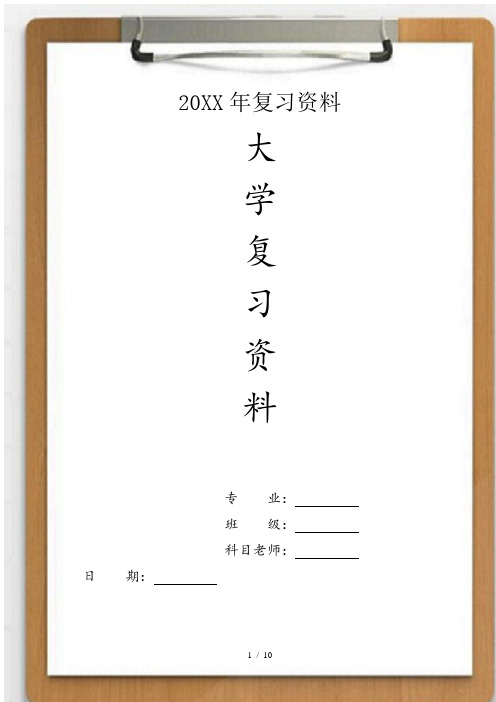
20XX年复习资料大学复习资料专业:班级:科目老师:日期:Book 1 Translation ExercisesUnit 1 Translation1) 我累了。
昨晚我不该那么晚睡觉。
(should not + 动词完成式)2) 我和鲍勃不是很熟,不过我们偶尔一起出去喝一杯。
(occasional)3) 我们应该到火车站接她。
(be supposed to)4) 你可以清楚地看到有人快要淹死, 而你却没有采取行动救他们。
(drown, take action)5) 包括周末在内,仅仅还有20XXXX天时间可以用来买圣诞礼物。
(including)6) 如果不立即采取行动,许多种野生动物就会因饥饿而死亡。
(without, hunger)1)I’m tired. I shouldn’t have gone to bed so late last night.2)I don’t/didn’t know Bob very well, but we go/went out for anoccasional drink together.3)We’re supposed to meet her at the train station.4)You could clearly see people drowning, but/and yet you took noaction to save them.5)Including weekends, there are only twelve more days to buyChristmas presents.6)Without immediate action, many kinds of wild animals would die fromhunger.Unit 2 Translation1) 那首歌总是使她回想起在芝加哥度过的那个夜晚。
(remind… of…)2) 街角处刚巧有一位警察,我便向他问路。
新编大学英语综合教程第一册7-10单元课后翻译
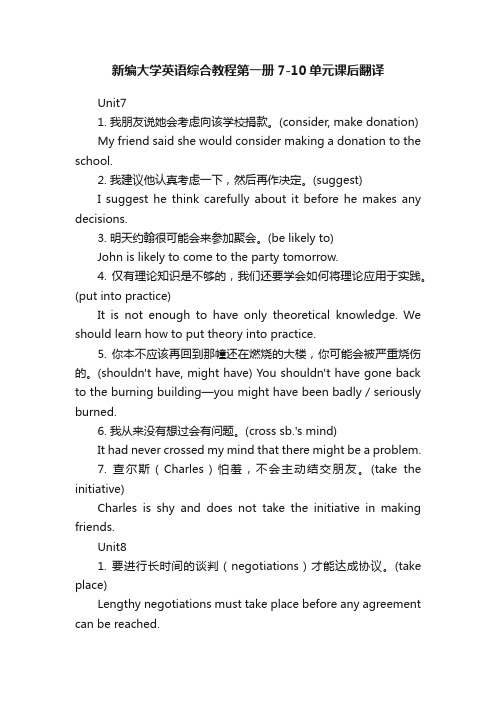
新编大学英语综合教程第一册7-10单元课后翻译Unit71. 我朋友说她会考虑向该学校捐款。
(consider, make donation)My friend said she would consider making a donation to the school.2. 我建议他认真考虑一下,然后再作决定。
(suggest)I suggest he think carefully about it before he makes any decisions.3. 明天约翰很可能会来参加聚会。
(be likely to)John is likely to come to the party tomorrow.4. 仅有理论知识是不够的,我们还要学会如何将理论应用于实践。
(put into practice)It is not enough to have only theoretical knowledge. We should learn how to put theory into practice.5. 你本不应该再回到那幢还在燃烧的大楼,你可能会被严重烧伤的。
(shouldn't have, might have) You shouldn't have gone back to the burning building—you might have been badly / seriously burned.6. 我从来没有想过会有问题。
(cross sb.'s mind)It had never crossed my mind that there might be a problem.7. 查尔斯(Charles)怕羞,不会主动结交朋友。
(take the initiative)Charles is shy and does not take the initiative in making friends.Unit81. 要进行长时间的谈判(negotiations)才能达成协议。
现代大学英语精读第二版_第一册_课文翻译
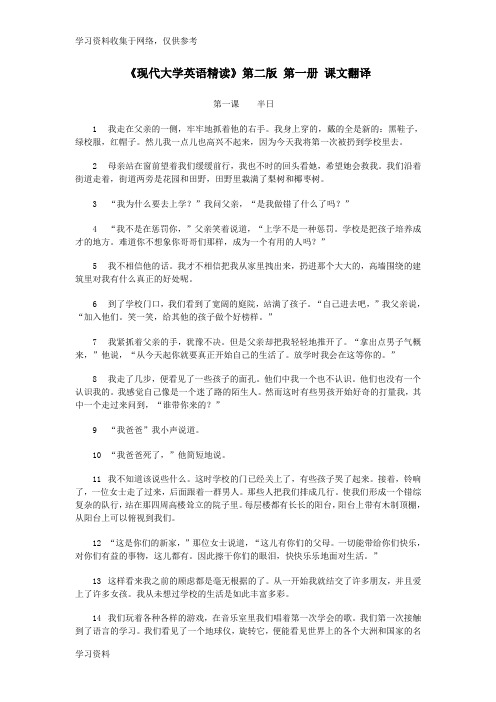
《现代大学英语精读》第二版第一册课文翻译第一课半日1我走在父亲的一侧,牢牢地抓着他的右手。
我身上穿的,戴的全是新的:黑鞋子,绿校服,红帽子。
然儿我一点儿也高兴不起来,因为今天我将第一次被扔到学校里去。
2母亲站在窗前望着我们缓缓前行,我也不时的回头看她,希望她会救我。
我们沿着街道走着,街道两旁是花园和田野,田野里栽满了梨树和椰枣树。
3“我为什么要去上学?”我问父亲,“是我做错了什么了吗?”4“我不是在惩罚你,”父亲笑着说道,“上学不是一种惩罚。
学校是把孩子培养成才的地方。
难道你不想象你哥哥们那样,成为一个有用的人吗?”5我不相信他的话。
我才不相信把我从家里拽出来,扔进那个大大的,高墙围绕的建筑里对我有什么真正的好处呢。
6到了学校门口,我们看到了宽阔的庭院,站满了孩子。
“自己进去吧,”我父亲说,“加入他们。
笑一笑,给其他的孩子做个好榜样。
”7我紧抓着父亲的手,犹豫不决。
但是父亲却把我轻轻地推开了。
“拿出点男子气概来,”他说,“从今天起你就要真正开始自己的生活了。
放学时我会在这等你的。
”8我走了几步,便看见了一些孩子的面孔。
他们中我一个也不认识。
他们也没有一个认识我的。
我感觉自己像是一个迷了路的陌生人。
然而这时有些男孩开始好奇的打量我,其中一个走过来问到,“谁带你来的?”9“我爸爸”我小声说道。
10“我爸爸死了,”他简短地说。
11我不知道该说些什么。
这时学校的门已经关上了,有些孩子哭了起来。
接着,铃响了,一位女士走了过来,后面跟着一群男人。
那些人把我们排成几行。
使我们形成一个错综复杂的队行,站在那四周高楼耸立的院子里。
每层楼都有长长的阳台,阳台上带有木制顶棚,从阳台上可以俯视到我们。
12“这是你们的新家,”那位女士说道,“这儿有你们的父母。
一切能带给你们快乐,对你们有益的事物,这儿都有。
因此擦干你们的眼泪,快快乐乐地面对生活。
”13这样看来我之前的顾虑都是毫无根据的了。
从一开始我就结交了许多朋友,并且爱上了许多女孩。
Unit-10-Agriculture新编大学英语第二版第一册课文翻译
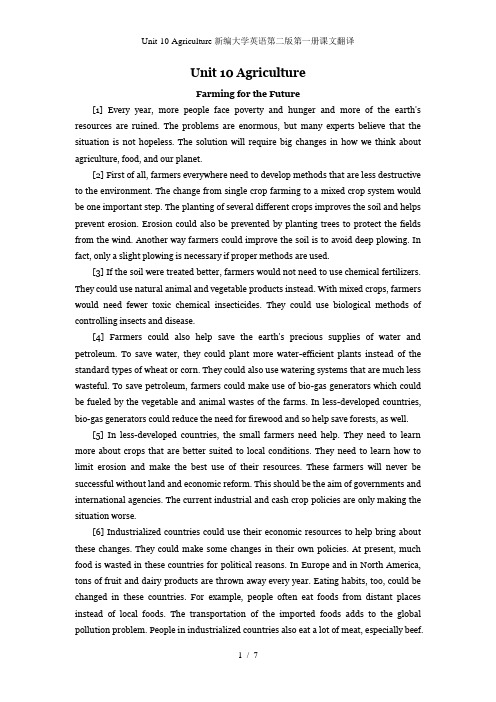
Unit 10 AgricultureFarming for the Future[1] Every year, more people face poverty and hunger and more of the earth's resources are ruined. The problems are enormous, but many experts believe that the situation is not hopeless. The solution will require big changes in how we think about agriculture, food, and our planet.[2] First of all, farmers everywhere need to develop methods that are less destructive to the environment. The change from single crop farming to a mixed crop system would be one important step. The planting of several different crops improves the soil and helps prevent erosion. Erosion could also be prevented by planting trees to protect the fields from the wind. Another way farmers could improve the soil is to avoid deep plowing. In fact, only a slight plowing is necessary if proper methods are used.[3] If the soil were treated better, farmers would not need to use chemical fertilizers. They could use natural animal and vegetable products instead. With mixed crops, farmers would need fewer toxic chemical insecticides. They could use biological methods of controlling insects and disease.[4] Farmers could also help save the earth's precious supplies of water and petroleum. To save water, they could plant more water-efficient plants instead of the standard types of wheat or corn. They could also use watering systems that are much less wasteful. To save petroleum, farmers could make use of bio-gas generators which could be fueled by the vegetable and animal wastes of the farms. In less-developed countries, bio-gas generators could reduce the need for firewood and so help save forests, as well.[5] In less-developed countries, the small farmers need help. They need to learn more about crops that are better suited to local conditions. They need to learn how to limit erosion and make the best use of their resources. These farmers will never be successful without land and economic reform. This should be the aim of governments and international agencies. The current industrial and cash crop policies are only making the situation worse.[6] Industrialized countries could use their economic resources to help bring about these changes. They could make some changes in their own policies. At present, much food is wasted in these countries for political reasons. In Europe and in North America, tons of fruit and dairy products are thrown away every year. Eating habits, too, could be changed in these countries. For example, people often eat foods from distant places instead of local foods. The transportation of the imported foods adds to the global pollution problem. People in industrialized countries also eat a lot of meat, especially beef.In fact, a large percentage of the grain grown in these countries is used for feeding cattle. If people in these countries ate less meat, there would be more grain to feed the hungry people of the world.[7] The ideal agricultural system would be sustainable; that is, its level of productivity could be continued indefinitely and the damage to the environment much less. This is a war which must be won because it would have only winners for both farmers and consumers of farm products.未来农耕1 现在面临贫困和饥饿的人一年比一年多,地球资源遭到的破坏也一年比一年严重。
新编英语教程unit1,2,3,4,5,8,9,10,11 课文翻译
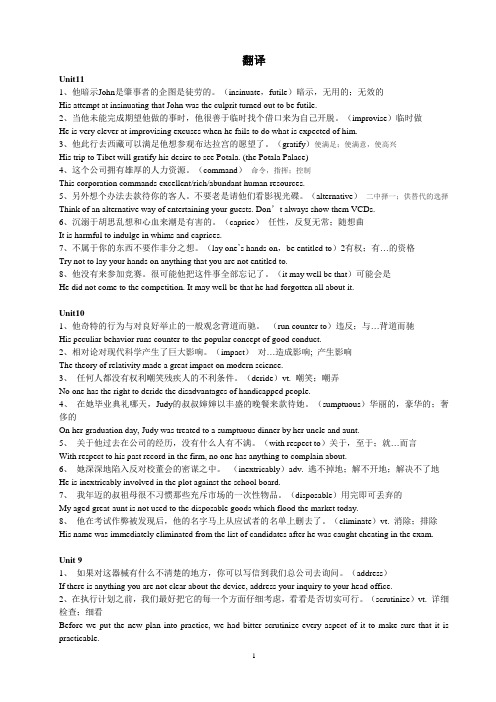
翻译Unit111、他暗示John是肇事者的企图是徒劳的。
(insinuate,futile)暗示,无用的;无效的His attempt at insinuating that John was the culprit turned out to be futile.2、当他未能完成期望他做的事时,他很善于临时找个借口来为自己开脱。
(improvise)临时做He is very clever at improvising excuses when he fails to do what is expected of him.3、他此行去西藏可以满足他想参观布达拉宫的愿望了。
(gratify)使满足;使满意,使高兴His trip to Tibet will gratify his desire to see Potala. (the Potala Palace)4、这个公司拥有雄厚的人力资源。
(command)命令,指挥;控制This corporation commands excellent/rich/abundant human resources.5、另外想个办法去款待你的客人。
不要老是请他们看影视光碟。
(alternative)二中择一;供替代的选择Think of an alternative way of entertaining your guests. Don’t always show them VCDs.6、沉溺于胡思乱想和心血来潮是有害的。
(caprice)任性,反复无常;随想曲It is harmful to indulge in whims and caprices.7、不属于你的东西不要作非分之想。
(lay one’s hands on,be entitled to)2有权;有…的资格Try not to lay your hands on anything that you are not entitled to.8、他没有来参加竞赛。
新编大学英语综合教程第一册7-10单元课后翻译
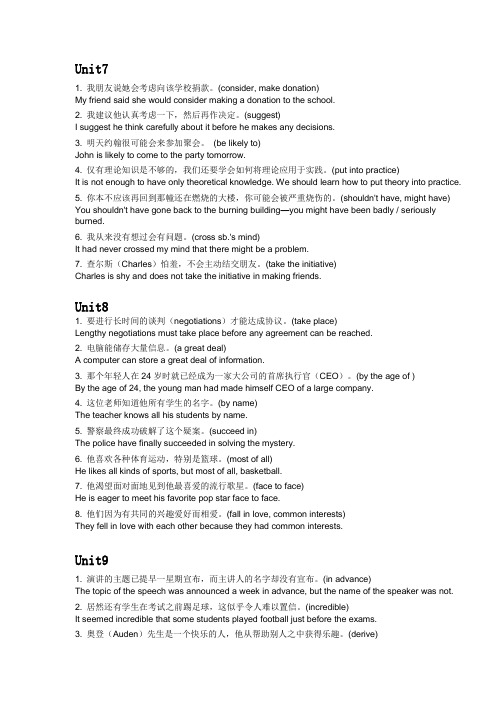
Unit71. 我朋友说她会考虑向该学校捐款。
(consider, make donation)My friend said she would consider making a donation to the school.2. 我建议他认真考虑一下,然后再作决定。
(suggest)I suggest he think carefully about it before he makes any decisions.3. 明天约翰很可能会来参加聚会。
(be likely to)John is likely to come to the party tomorrow.4. 仅有理论知识是不够的,我们还要学会如何将理论应用于实践。
(put into practice)It is not enough to have only theoretical knowledge. We should learn how to put theory into practice.5. 你本不应该再回到那幢还在燃烧的大楼,你可能会被严重烧伤的。
(shouldn't have, might have) You shouldn't have gone back to the burning building—you might have been badly / seriously burned.6. 我从来没有想过会有问题。
(cross sb.'s mind)It had never crossed my mind that there might be a problem.7. 查尔斯(Charles)怕羞,不会主动结交朋友。
(take the initiative)Charles is shy and does not take the initiative in making friends.Unit81. 要进行长时间的谈判(negotiations)才能达成协议。
最新Unit-10-Agriculture新编大学英语第二版第一册课文翻译
Unit 10 AgricultureFarming for the Future[1] Every year, more people face poverty and hunger and more of the earth's resources are ruined. The problems are enormous, but many experts believe that the situation is not hopeless. The solution will require big changes in how we think about agriculture, food, and our planet.[2] First of all, farmers everywhere need to develop methods that are less destructive to the environment. The change from single crop farming to a mixed crop system would be one important step. The planting of several different crops improves the soil and helps prevent erosion. Erosion could also be prevented by planting trees to protect the fields from the wind. Another way farmers could improve the soil is to avoid deep plowing. In fact, only a slight plowing is necessary if proper methods are used.[3] If the soil were treated better, farmers would not need to use chemical fertilizers. They could use natural animal and vegetable products instead. With mixed crops, farmers would need fewer toxic chemical insecticides. They could use biological methods of controlling insects and disease.[4] Farmers could also help save the earth's precious supplies of water and petroleum. To save water, they could plant more water-efficient plants instead of the standard types of wheat or corn. They could also use watering systems that are much less wasteful. To save petroleum, farmers could make use of bio-gas generators which could be fueled by the vegetable and animal wastes of the farms. In less-developed countries, bio-gas generators could reduce the need for firewood and so help save forests, as well.[5] In less-developed countries, the small farmers need help. They need to learn more about crops that are better suited to local conditions. They need to learn how to limit erosion and make the best use of their resources. These farmers will never be successful without land and economic reform. This should be the aim of governments and international agencies. The current industrial and cash crop policies are only making the situation worse.[6] Industrialized countries could use their economic resources to help bring about these changes. They could make some changes in their own policies. At present, much food is wasted in these countries for political reasons. In Europe and in North America, tons of fruit and dairy products are thrown away every year. Eating habits, too, could be changed in these countries. For example, people often eat foods from distant places instead of local foods. The transportation of the imported foods adds to the global pollution problem. People in industrialized countries also eat a lot of meat, especially beef.In fact, a large percentage of the grain grown in these countries is used for feeding cattle. If people in these countries ate less meat, there would be more grain to feed the hungry people of the world.[7] The ideal agricultural system would be sustainable; that is, its level of productivity could be continued indefinitely and the damage to the environment much less. This is a war which must be won because it would have only winners for both farmers and consumers of farm products.未来农耕1 现在面临贫困和饥饿的人一年比一年多,地球资源遭到的破坏也一年比一年严重。
新编大学英语第二版第一册课后翻译答案
P291
1. The topic of the speech is announced a week in advance,but the name of the apeaker ia not.
4.One of the essential points is that you should try to broaden your horizens.
5.The sense of humor is of use/help.Telling a joke about yourself sometimes can lighten the conversation.
2.Most of my time is spent studying the differences between Chinese and American cultures.
3.The statement/sentence is so clear that it can't cause any misunderstanding.
2.He looked over my shoulder at the conveyer belt and shouted that he had seen his briefcase going through the opening at the end of the conveyor belt.
6.Without immediate action,many kinds of wild animals would die from hunger.
大学_《新编大学英语》第二版第一册课后翻译答案
《新编大学英语》第二版第一册课后翻译答案《新编大学英语》第二版第一册课后翻译答案《新编大学英语》(第二版)继续采用以学生为中心的主题教学模式,调整了难度与梯度,完善、优化了教材结构,开发了配套的视听说教程与快速阅读教程,辅以完备的多媒体及网络资源,着力培养学生的语言综合应用能力。
《新编大学英语》(第二版)围绕与校园、社会生活相关的主题,选取思想性强、语言规范的__展开读、写、说、译技能的综合训练。
注重教学双方的互动性,强调语言应用能力与文化素养的综合培养。
《新编大学英语视听说教程》提供生动有趣的录像短剧及丰富的听力材料。
从不同角度帮助学生提高听说技能,培养交际能力。
《新编大学英语快速阅读》通过有针对性的系统训练帮助学生掌握基本阅读技能,培养良好的阅读习惯,提高阅读效率。
更新后的集主干教材的配套网络课程、学习和教学资源、测试以及教学管理功能于一体,资源丰富,功能完善,操作方便,充分体现了交互式、个性化,自主型学习的理念。
《新编大学英语》第二版简介p13我累了,昨晚我不该那么晚睡觉1.Im tired,I should not have gone to bed so late last night.我和鲍勃不是很熟,不过我们偶尔一起出去喝一杯2.I dont/didnt know Bob very well,but we go/went out for an occasional drink together我们应该都火车站接她.3.We are supposed to meet her at the train station.你可以清楚的看到有人快淹死,而你却没有采取行动救他们4.You could clearly see people drowning,but/and yet you took no action to save them.包括周末在内,仅仅还有12天时间可以用来买圣诞礼物5.Including weekends,there are only twelve more days to buy Christmas presents.如果不立即采取行动,许多野生动物就会因饥饿而死亡6.Without immediate action,many kinds of wild animals would die from hunger.P47那首歌总是会让她回想起在芝加哥度过的那个晚上1.That songs always reminded her of the night spent in Chicago.街角处刚好有一位警察,我便向他问路2.There happened to be a policeman on the corner,so I asked him the way.由于天气恶劣,今天所有去纽约的航班都延误了3.All flights to New York today are delayed because of the bad weather.谁有责任谁就必须赔偿损失4.Whoever is responsible willl have to pay for the damage. 我找不到我的支票簿,我准是把它留在家里了5.I can not find my checkbook ,i must have left it at home.到足球比赛快开始时,暴风雨已经停了6.By the time ,the football match was going to start ,the storm had already stopped.p68一个年轻人来到票务柜台,问是否有人把他的公文包交到了柜台1.A young man came to the check-in counter and asked if his briefcase had been turned in他朝我身后的行李传送带瞥了一眼,然后大声喊道,他看到公文包正穿过传送带尽头的那个口子.2.He looked over my shoulder at the conveyer belt and shouted that he had seen his briefcase going through the opening at the end of the conveyor belt.不幸的是,已经把他的公文包装到一架班机上了3.Unfortunately,his briefcase had already been loaded on one of the flights.我向他保证一找到公文包就给他打电话4.I assured him that we would calll him as soon as we found his briefcase.让我们吃惊的是,这个年轻人说他已经在自己的车里找到了公文包5.To our great surprise ,the young man said that he had already found his briefcase in his car .P81除非你有经验,否则你得不到这份工作1.You wont get the job unless you have got the experience.我把大部分的时间都花在研究中美文化的差异上了2.Most of my time is spent studying the differences between Chinese and American cultures.这句话意思极清楚,决不会引起误解3.The statement/sentence is so clear that it cant cause any misunderstanding.他希望能够给予她比现在更多的帮助4.He wishes he could give her more help than what he does now .穿上外套,否则你会感冒的5.Put on your coat ,or you will catch a cold .他的收藏品中加了一张毕加索的画6.She has added a picture of Picasso to her collection.我没意识到以前曾来过这7.I am not aware of ever having been here before.如果你继续对每个人这么粗鲁,你很快就会发现自己什么朋友都没了8.You will soon find yourself without any friends at all if you keep on being so rude to everybody.P103首先你得意识到在一个陌生环境中感觉紧张是很正常的1.First,you must be aware that feeling nervous is very normal in a strange environment./It is quite normal to feel nervoust in a strange environment.我们的思维比大部分人的讲话速度要快好几倍2.Our thoughts can race a long several times faster than most people speak为了使别人注意你,你必须学会怎样做一个良好的、体谅的听众.3.In order to get others attention, you must learn how to be a good and sympathetic listener.其中必不可少的一点是你得尽量扩大视野4.One of the essential points is that you should try to broaden your horizens.幽默感会有所帮助,有时讲个和自己有关的小笑话也会使谈话轻松起来5.The sense of humor is of use/help.Telling a joke about yourself sometimes can lighten the conversation.只有当你愿意交谈并认真的听的时候,你才能成功的与周围的人交朋友6.Only when you are willing to talk and listen attentively,can/will you succeed in making friends with the people around you.P117房间里热极了,请把窗户打开1.Its far too hot in the room,open the window,please!半夜里那嘈杂声把我们弄醒了2.The noise woke us up in the middle of the night.他不该对我说的话表示生气,那仅仅是个玩笑而已3.he should have been angry at what I said.It was nothing more thana joke我们邀请了所有的朋友去野餐,但是由于下雨只来了其中五位.4.We invited all our friends to the picnic but it rained and only five of them showed up.她视婚姻为严肃的事情5.She views marriage as a serious matter.令我失望的是,这部电影并不像我期待的那么好6.To my disappointment ,the movie didnt live up to my expectations.P153我过去常去看电影,但现在再也没有时间了1.I used to go to the cinema/movies a lot,but I neer have the time now.两个工人互相合作修理破裂的管子2.The two workers cooperated with each other to fix the broken pipe.这是一种残忍的做法,应该马上停止3.this is a cruel practice which should be stopped immediately.你的工作哪一方面最困难,哪一方面最有益4.What aspect of your job/work is(the)most difficult,and what aspect is(the)most rewarding?有些人认为他很粗野,但情况并非如此5.Some people think he is rude,but thats not the case.我会尽我所能帮忙,但我所能做的也有限6.Ill help as much as I can,but there is a limit to what I can do.P190他的努力工作使他得到了一大笔奖金1. Her hard work resulted in a big bonus for her.孩子们正在观察飞机起飞和降落2. Children were watching the planes take off and load.我总是一上船就晕船3. As soon as Im on board a ship I always feel sick.博物馆向公众开放的第一天,总共有0人前来参观4. A total of 0 people visited the museum on the first day when it was open to the public.委员会有科学家和工程师组成5. The committee consists of scientists and engineers.工作没有完成,我不敢回家6. I wouldnt dare to go home with the job unfinished.P221我们正在考虑卖房子1. We are considering selling the house.我建议他先等一会,然后再做决定2. I suggest he wait a while before he makes an decisions.明天约翰很可能会来参加聚会3. John is very likely to come to the party tomorrow.我们想知道他不接受这份工作的.原因4. Wed like to know the reason why she didnt accept the job.你本不应该回到那栋还在燃烧的大楼,你有可能会被严重烧伤5. You shouldnt have gone back t the burning building,you might have been badly/seriously burnt.我从来没有想过会有问题6. It/The thought had never crossed my mind that there might have be a problem.P257第二次世界大战结束于1939年1. World warⅡtook place in 1945.我爷爷喝酒喝得厉害2. My grandfather drinks a great deal.到65岁的时候,他仍在工作3. He was still working by the age of 65这个老师知道他所有学生的名字.4. The teacher knows all his students by name.警察最终成功破解了这个疑案5. The police have finally succeeded in solving the mystery.他喜欢各种体育运动,特别是篮球6. He likes all kinds of eports,but most of all,basketball.打电话和面对面说话不一样7. Talking on the phone is different from talking face to face.他们因为有共同的兴趣爱好而相爱8. They fell in love with each other because they had common interests.P291演讲的主题已提前一星期宣布,而主讲人的名字则没有1. The topic of the speech is announced a week in advance,but the name of the apeaker ia not.居然还有学生在考试之前踢足球,这似乎令人难以置信2. It seemed incredible that some students still played football before the exams.Auden先生是一个快乐的人,他从帮助别人中获得乐趣3. Mr.Auden is a happy man who derives pleasure from helping others两位美国人共同获得了去年的诺贝尔医学奖.4. Two Americans shared last years Nobel Prize for Medicine.首先我欢迎你参见此次会议5. First of all Id like to welcome you to the meeting.我不习惯于这样的奢侈,这是在浪费金钱6. Im not accustomed to such luxury.Its a waste of money.考试结果将于周五下午张贴出来7. The results of the exam will be put up on Friday afternoon.一些残酷的动物实验是以科学的名义进行的8. Some cruel experiments on animals are carried out in the name of science.最好的减肥方法是不吃含高脂肪的食物1. The best way to lose weight is to avoid eating fatty foods.交通不便曾是导致饥饿的主要原因2. One of the main causes of hunger used to be lack of transportation.浪费的包装会抬高食品的价格3. Wasteful packaging will add to the price of food/food price.没有农业的发展,经济改革就不会成功4. Economic reform would not be successful without the development of agriculture.明年农民们将种植更多的经济作物以取代粮食作物5. The farmers will grow more cash crops next year instead of grains目前,世界上还有某些地方的农民仍然在利用动物做劳力.6. At present,there are still places in the world where farmers make use of animal labor.。
新编大学英语2课文翻译(完整版)
新编大学英语2课文翻译(完整版)善良之心,久久相依 ................................... 当时我没有意识到,是爸爸帮我保持平衡奥古斯塔斯 ? J ? 布洛克1 随着我渐渐长大,当别人看见我和爸爸在一起,我会觉得很尴尬。
他身材矮小,走起路来跛得很厉害。
我们一起走时,他要把手搭在我的肩上才能保持平衡,人们就会盯着我们看。
对这种不必要的注意我觉得非常难堪。
他也许曾注意到,或着觉得烦恼,但他从来没有流露出来。
2 要协调我们的步伐并不容易,他(的步子)一瘸一拐的,我(走起来)则缺乏耐心。
因此,我们走路的时候并不怎么说话。
但出发时,他总是说:“你定步伐,我会尽量跟上。
”3 我们通常在家和地铁之间来往,这是他上班的必由之路。
不论生病还是碰到恶劣的天气他都去上班,几乎没有旷过一天工。
即使别人无法上班,他也要去办公室。
对他来说这是一种自豪。
4 当地上有冰或雪的时候,即使有人帮忙他也无法走路。
这时,我或者我的姐妹就用孩子玩的雪撬拉着他,穿过纽约布鲁克林的街道,直到地铁的入口处。
一到那儿,他就能紧紧抓住扶手一直走下去, 地铁道里比较暖和,下面的楼梯不结冰。
曼哈顿的地铁站正好是他办公楼的地下室,因此除了从布鲁克林我们去接他的地方到回家为止,他都不用再出去。
5 一个成年男子要有多少勇气才能承受这种屈辱和压力,我现在想来惊讶不已。
他从没有痛苦或抱怨,他是怎么做到这一步的我感到不可思议。
6 他从不把自己当作同情的对象,也从不对更幸运的或更能干的人表示任何嫉妒。
他在别人身上所寻找的是一颗“善心”。
如果他找到了一颗善心,那么有这么颗心的人对他来说就是一位大好人了。
7 由于年龄的增长,我相信那是一种用来判断人的恰当的标准,尽管我还不能精确地知道什么是一颗“善心”。
但是,当我自己没有的时候,我是知道的。
8 尽管很多活动我爸爸不能参加,但他还是尽量用某种方式参与。
当本地的一支棒球队发现缺经理的时候,他使它维持下去。
- 1、下载文档前请自行甄别文档内容的完整性,平台不提供额外的编辑、内容补充、找答案等附加服务。
- 2、"仅部分预览"的文档,不可在线预览部分如存在完整性等问题,可反馈申请退款(可完整预览的文档不适用该条件!)。
- 3、如文档侵犯您的权益,请联系客服反馈,我们会尽快为您处理(人工客服工作时间:9:00-18:30)。
Unit 10 AgricultureFarming for the Future[1] Every year, more people face poverty and hunger and more of the earth's resources are ruined. The problems are enormous, but many experts believe that the situation is not hopeless. The solution will require big changes in how we think about agriculture, food, and our planet.[2] First of all, farmers everywhere need to develop methods that are less destructive to the environment. The change from single crop farming to a mixed crop system would be one important step. The planting of several different crops improves the soil and helps prevent erosion. Erosion could also be prevented by planting trees to protect the fields from the wind. Another way farmers could improve the soil is to avoid deep plowing. In fact, only a slight plowing is necessary if proper methods are used.[3] If the soil were treated better, farmers would not need to use chemical fertilizers. They could use natural animal and vegetable products instead. With mixed crops, farmers would need fewer toxic chemical insecticides. They could use biological methods of controlling insects and disease.[4] Farmers could also help save the earth's precious supplies of water and petroleum. To save water, they could plant more water-efficient plants instead of the standard types of wheat or corn. They could also use watering systems that are much less wasteful. To save petroleum, farmers could make use of bio-gas generators which could be fueled by the vegetable and animal wastes of the farms. In less-developed countries, bio-gas generators could reduce the need for firewood and so help save forests, as well.[5] In less-developed countries, the small farmers need help. They need to learn more about crops that are better suited to local conditions. They need to learn how to limit erosion and make the best use of their resources. These farmers will never be successful without land and economic reform. This should be the aim of governments and international agencies. The current industrial and cash crop policies are only making the situation worse.[6] Industrialized countries could use their economic resources to help bring about these changes. They could make some changes in their own policies. At present, much food is wasted in these countries for political reasons. In Europe and in North America, tons of fruit and dairy products are thrown away every year. Eating habits, too, could be changed in these countries. For example, people often eat foods from distant places instead of local foods. The transportation of the imported foods adds to the global pollution problem. People in industrialized countries also eat a lot of meat, especially beef.In fact, a large percentage of the grain grown in these countries is used for feeding cattle. If people in these countries ate less meat, there would be more grain to feed the hungry people of the world.[7] The ideal agricultural system would be sustainable; that is, its level of productivity could be continued indefinitely and the damage to the environment much less. This is a war which must be won because it would have only winners for both farmers and consumers of farm products.未来农耕1 现在面临贫困和饥饿的人一年比一年多,地球资源遭到的破坏也一年比一年严重。
这些问题极为严重,不过许多专家认为情况还没有到令人绝望的地步。
要解决它们就需要我们对农业、食品和整个地球的看法做出重大改变。
2 首先,世界各地的农民都必须研究开发对环境破坏性较小的耕作模式。
重要的一步是把单一作物改为多种作物混合耕种。
种植多种作物能改善土壤,有助于防止水土流失。
通过植树来保护耕地不受风害也能防止水土流失。
农民改善土壤的另一个办法是避免深耕。
实际上,如果方法得当,只需浅耕即可。
3 只要土地耕作比较得当,农民就没有必要使用化肥,而可以使用天然的动植物肥料。
多种作物混合耕种后,就能少用有毒的化学杀虫剂。
农民还可以用生物手段控制病虫害。
4 农民还能帮助节约地球上珍贵的水资源和石油资源。
为了节约水,农民可以多种节水型作物以取代常规的小麦和玉米。
还可以使用更为节水的灌溉系统。
为了节约石油,他们可以利用生物气发电机。
生物气发电机的燃料由农场上的蔬菜和动物的垃圾和粪便提供。
在欠发达的国家里,生物气发电机能减少对木柴的需求,从而也有助于保护森林。
5 在欠发达的国家里,小农场主们需要帮助。
他们需要掌握更能适应当地条件的作物的有关知识。
他们需要掌握怎样控制水土流失和最充分利用自己的资源。
不进行土地和经济改革,这些农场主永远不会成功。
这种改革应该是各国政府和国际机构的目标。
目前施行的这些工业和经济作物政策只是把事情弄得更糟。
6 工业化国家可以用他们的经济资源帮助促成这些变化。
他们还可以对自己的政策作些改变。
目前,这些国家因为政治原因而浪费了很多食品。
在欧洲和北美每年都有成吨成吨的水果和奶制品被扔掉。
这些国家的饮食习惯也可作些改变。
例如,人们常吃那些来自遥远地方的东西,而不吃本地产的。
进口食品的运输加重了全球的污染问题。
工业化国家的人们还食用大量的肉类,尤其是牛肉。
事实上,这些国家所生产的粮食有很大一部分是用来喂牛的。
假如这些国家的人们少吃些肉,就会有更多的粮食提供给世界上正在挨饿的人们。
7 理想的农业体系应当是可持续性的,也就是说,其生产力水平能长期保持下去而对环境的破坏却小得多。
这是一场必须打胜的战斗,因为无论是对农民还是对农产品消费者而言,这场战斗只有赢者。
Dairying and Dairy Products[1] When did people begin using milk from animals? Probably about the time they began domesticating animals - some 8,000 to 10,000 years ago. Meat was certainly the most important food first provided by domesticated animals. But the milk of cattle, goats, sheep, or other animals also became part of people's diets. As agriculture developed, milk and other dairy products, such as butter, cheese, and yogurt, became more and more important in the diet of human beings.[2] For many thousands of years, a large percentage of the population was engaged in agriculture. Families commonly kept a few goats, cows, or sheep on their farms to provide fresh milk and other dairy products. With the coming of the industrial age, however, fewer and fewer people made their living through agriculture. The production of milk and products made from milk slowly became an industry.[3] The development of the dairy industry was closely linked with the development of better crops and animals and with a host of technological changes, such as improved transportation, refrigeration and advancements in milk processing. For example, in earlier times, one of the biggest problems was keeping milk fresh so that it would not spoil. Milk used to be kept cool by putting a container in the shade or in cold spring water near the farm or home. Today it is automatically cooled as soon as it is removed from the cow; it is carried long distances in large refrigerated tanks and then processed and packaged for placement in refrigerated showcases in grocery stores. The production of milk in many countries is now a large, scientifically based, highly mechanized industry.[4] The life of a dairy farmer is usually a rigorous one. Cows must be milked and other chores done seven days a week throughout the year. Hand milking has given way to the use of milking machines, but it must still be done twice a day. Family labor frequently makes up a large part of the labor force, especially on an average-sized farm. The sons and daughters of dairy farmers sometimes learn to put in long days and to carry heavy responsibilities at a young age.[5] Since the middle of the 20th century, there has been a great decrease in the number of dairy farms in the United States and Canada. In general, however, the farms remaining are large, have highly productive cows, and are managed with great skill. These farms represent the survivors in a very competitive business.Future Outlook for Dairy Farming[6] Before the end of the 20th century, a further reduction in the number of dairy farms is likely, as the less competitive farmers are forced to give up dairying [N]. World population, however, is increasing at a rapid rate, and the need for food will obviously increase as well. It is likely, therefore, that milk and milk products will be greatly in demand to help feed a hungry world.[7] Dairy scientists have learned how to increase greatly the productivity of cows. Dairy farmers should thus be in an excellent position to meet the challenges of the future. Important developments in milk processing and the development of new products mean that dairy foods will be more easily stored, transported, and made available to people the world over.乳品业和乳制品1 人们是从何时开始使用动物奶的呢?大约是在8,000 到10,000 年以前,从他们开始驯养动物时起。
